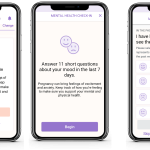Can social media be used to connect sexual minorities with others and promote acceptance? Or are these popularity-driven platforms fuel for depression in an already vulnerable group?
As the new recipient of a competitive federal research grant, César G. Escobar-Viera, M.D., Ph.D., postdoctoral associate at the University of Pittsburgh Center for Research on Media, Technology and Health, plans to find out.
“The odds are that the impact of social media use on gay, lesbian and bisexual people is not so black-and-white,” said Escobar-Viera, a native of Paraguay, where he previously served as chief medical officer of the country’s only public psychiatric hospital. “There is likely a middle ground where it brings some good with the bad, but we need to understand that in a quantifiable, scientific context because social media is with us for the foreseeable future. Instructing people to stay away from it is not practical and may not be particularly beneficial.”
Previous studies that Escobar-Viera has been involved with at Pitt’s Center for Research on Media, Technology and Health, have linked social media use–particularly how often people use social media and how many platforms they maintain a presence on–to depression, sleep disturbance, body image issues and feelings of isolation. Those studies were conducted among a general population of young adults.
Sexual minorities are at disproportionately higher risk for some health problems, including depression, according to the National Academy of Medicine, among others.
With $1.4 million in funding from the National Institutes of Health’s Pathway to Independence Award, Escobar-Viera will collect and analyze both interviews and survey data from lesbian, gay and bisexual young adults to explore social media’s effect on sexual minorities. He’ll use what he learns to develop and test an intervention to mitigate risks and enhance benefits that can come from social media.
“When we recruited Dr. Escobar-Viera to Pitt, we were extremely fortunate to bring in someone with his level of expertise in the mental health of minorities and his global health perspective,” said Brian Primack, M.D., Ph.D., director of Pitt’s Center for Research on Media, Technology and Health and dean of the Honors College. “His earning this highly competitive grant on his first try is tremendous and speaks to the innovation and value of his approach. I am personally and professionally honored to mentor him and eager to learn from the discoveries he will make in the course of this research.”









